The 30th ACM/SIGAPP Symposium On Applied Computing (SAC 2015), pp. 1344-1349, 08/2015. DOI
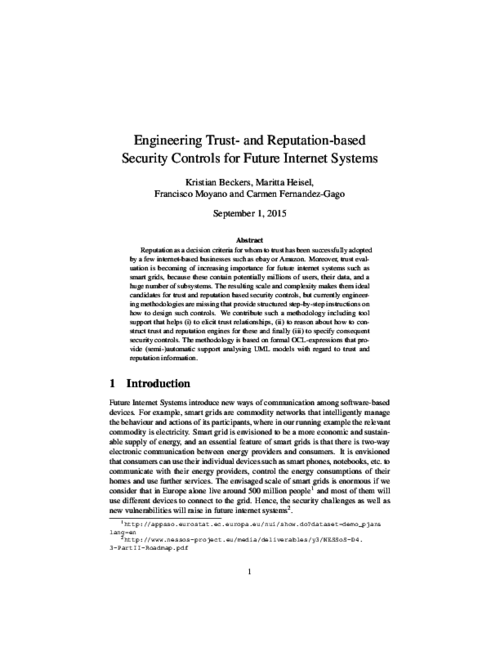
|
"Engineering Secure Future Internet Services and Systems- Current Research", Lecture Notes in Computer Science, vol. 8431, no. Lect.Notes ComputerState-of-the-Art Surveys, Springer , 2014. AbstractThis State-of-the-Art Survey contains a selection of papers representing state-of-the-art results in the engineering of secure software-based Future Internet services and systems, produced by the NESSoS project researchers. The engineering approach of the Network of Excellence NESSoS, funded by the European Commission, is based on the principle of addressing security concerns from the very beginning in all software development phases, thus contributing to reduce the amount of software vulnerabilities and enabling the systematic treatment of security needs through the engineering process. The 15 papers included in this volume deal with the main NESSoS research areas: security requirements for Future Internet services; creating secure service architectures and secure service design; supporting programming environments for secure and composable services; enabling security assurance and integrating former results in a risk-aware and cost-aware software life-cycle. 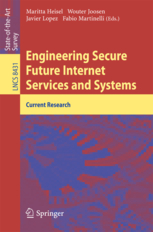 |  |
Engineering Secure Future Internet Services and Systems, vol. LNCS 8431, no. 8431, Springer, pp. 180-209, 03/2014. DOI
Abstract
The Future Internet (FI) comprises scenarios where many heterogeneous and dynamic entities must interact to provide services (e.g., sensors, mobile devices and information systems in smart city scenarios). The dynamic conditions under which FI applications must execute call for self-adaptive software to cope with unforeseeable changes in the application environment. Models@run.time is a promising model-driven approach that supports the runtime adaptation of distributed, heterogeneous systems. Yet frameworks that accommodate this paradigm have limited support to address security concerns, hindering their usage in real scenarios. We address this challenge by enhancing models@run.time with the concepts of trust and reputation. Trust improves decision-making processes under risk and uncertainty and constitutes a distributed and flexible mechanism that does not entail heavyweight administration. This chapter introduces a trust and reputation framework that is integrated into a distributed component model that implements the models@run.time paradigm, thus allowing software components to include trust in their reasoning process. The framework is illustrated in a smart grid scenario.
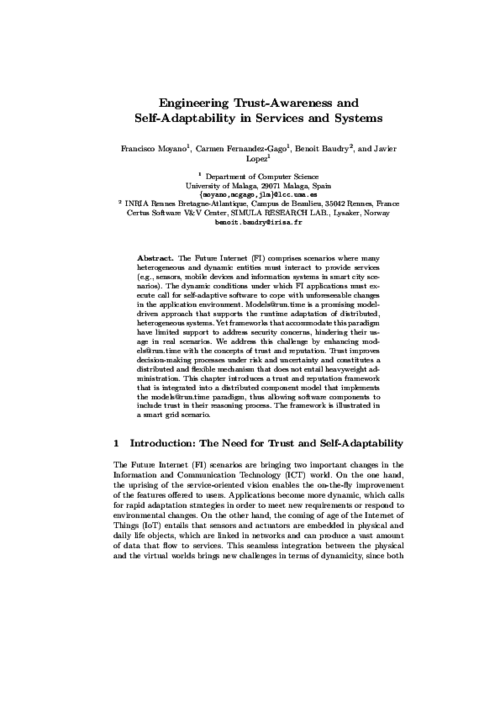
Future Internet Assembly 2011: Achievements and Technological Promises (FIA 2011), LNCS 6656, Springer Berlin Heidelberg, pp. 177-191, 2011.
Abstract
In this paper we analyze the need and the opportunity forestablishing a discipline for engineering secure Future Internet Services,typically based on research in the areas of software engineering, of serviceengineering and security engineering. Generic solutions that ignore thecharacteristics of Future Internet services will fail, yet it seems obviousto build on best practices and results that have emerged from variousresearch communities.The paper sketches various lines of research and strands within each lineto illustrate the needs and to sketch a community wide research plan. Itwill be essential to integrate various activities that need to be addressedin the scope of secure service engineering into comprehensive softwareand service life cycle support. Such a life cycle support must deliverassurance to the stakeholders and enable risk and cost management forthe business stakeholders in particular. The paper should be considereda call for contribution to any researcher in the related sub domains inorder to jointly enable the security and trustworthiness of Future Internetservices.

XIV Jornadas de Ingeniería del Software y Bases de Datos (JISBD 2009), Antonio Vallecillo and Goiuria Sagardui (Eds.), pp. 331-342, September, 2009.
Abstract
Los sistemas Grid nos permiten construir sistemas complejos concaracterísticas diferenciadoras (interoperabilidad entre múltiples dominios deseguridad, autenticación y autorización a través de dominios, sistema dinámicoy heterogéneo, etc.). Con el desarrollo de la tecnología wireless y losdispositivos móviles, el Grid llega a ser el candidato perfecto para que losusuarios móviles puedan realizar trabajos complejos, a la vez que añaden nuevacapacidad computacional al Grid. Estamos construyendo un proceso completode desarrollo para sistemas Grid móviles seguros, y una de las actividades es elanálisis de requisitos, que está basado en casos de uso reutilizables. En esteartículo, presentaremos una extensión UML para casos de uso de seguridad yGrid, los cuales capturan el comportamiento de este tipo de sistemas. Estaextensión UML está siendo aplicado a un caso real para construir diagramas decasos de uso de la aplicación, incorporando los aspectos de seguridadnecesarios.
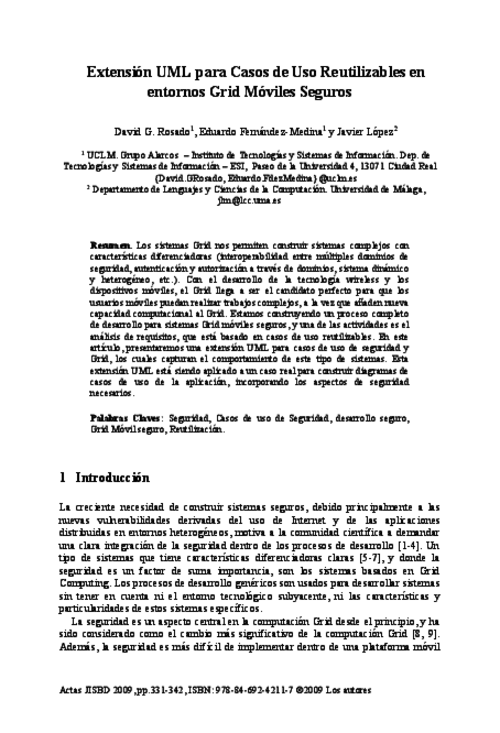
Third International Conference on Software and Data Technologies (ICSOFT’08), Springer, pp. 146-151, 2008.
Abstract
The interest to incorporate mobile devices into Grid systems has arisen with two main purposes. The firstone is to enrich users of these devices while the other is that of enriching the own Grid infrastructure.Security of these systems, due to their distributed and open nature, is considered a topic of great interest. Aformal approach to security in the software life cycle is essential to protect corporate resources. However,little attention has been paid to this aspect of software development. Due to its criticality, security should beintegrated as a formal approach into the software life cycle. We are developing a methodology ofdevelopment for secure mobile Grid computing based systems that helps to design and build secure Gridsystems with support for mobile devices directed by use cases and security use cases and focused onservice-oriented security architecture. In this paper, we will present one of the first steps of ourmethodology consisting of analyzing security requirements of mobile grid systems. This analysis will allowus to obtain a set of security requirements that our methodology must cover and implement.
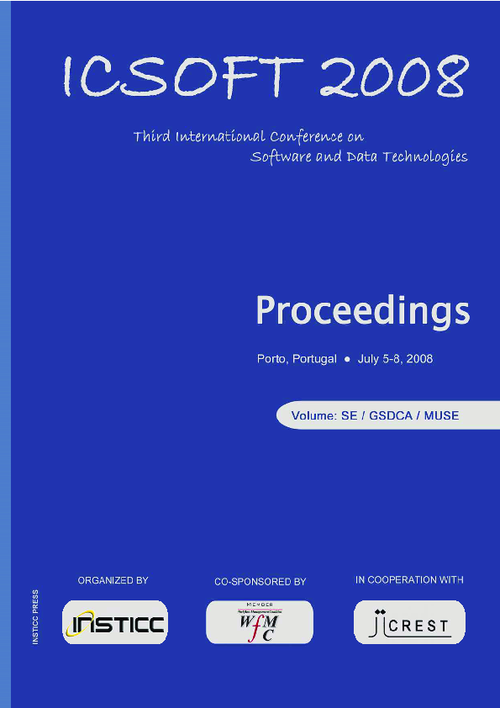
 ]
]